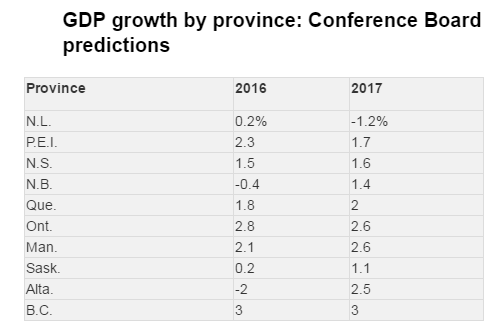The Canadian economy is expected to grow 1.5% in 2016
The Canadian economy is expected to grow over the next two years, but the growth of individual provinces will vary widely, according to a report from the Conference Board of Canada. British Columbia, Ontario, Manitoba and Prince Edward Island are expected have GDP growth rates of more than 2%, while more energy-dependent provinces will likely struggle.
British Columbia is expected to be the fastest-growing province for the next two years – with its economy expanding 3% in both 2016 and 2017. Even though the province faces headwinds from a weak mining sector, forestry, construction, transportation and the real estate industry are expected to more than pick up the slack.
Ontario’s GDP is expected to benefit from export growth in the automotive industry, while Manitoba sees its agricultural and service sectors grow, and Prince Edward Island enjoys growth in housing and manufacturing.
Energy-focused provinces face more difficulties
Alberta is expected to be the most heavily hit province in the coming year, with the economy contracting 2%. Low oil prices and the impact of the Fort McMurray fires are taking their toll on the energy-focused economy, leading Alberta into its worst economic downturn in 30 years, according to the think tank.
The Conference Board of Canada believes that Alberta’s fortunes will turn in 2017, however, with expected economic growth of 2.5%. Much of that growth is expected to come with the rebuilding of Fort McMurray.
New Brunswick’s economy is expected to shrink 0.4% in 2016 due to “the unexpected shutdown of the Piccadilly potash mine,” the Conference Board said.
The mining downturn is also expected to take a toll on Saskatchewan, where the economy is forecast to grow just 0.2%. The province’s mining sector continues to suffer from lower oil, uranium, and potash prices, while the job market has been shedding jobs and consumers are reluctant to open their wallets, the report said.
Newfoundland and Labrador are facing tax hikes and government cuts that will considerably dampen the economic outlook over the next two years. The province is expected to post a sluggish 0.2% growth number this year, then contract 1.2% in 2017.
The Canadian economy grow 0.9% in terms of real GDP in 2015, reports CBC, just half as much as it did in 2014. While a weak energy sector will continue to create headwinds for Canada, the 1.5% growth projection for 2016 is an improvement over last year’s development.


